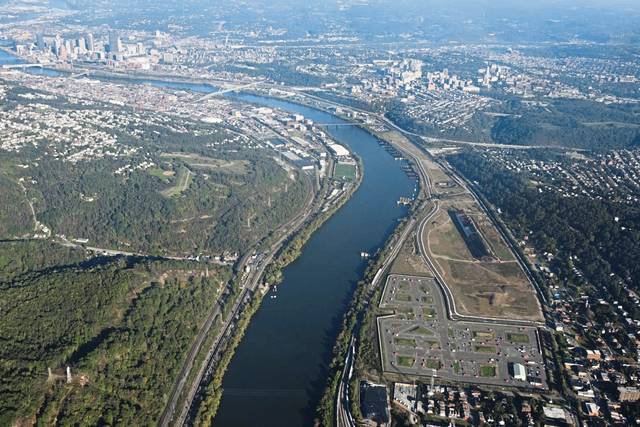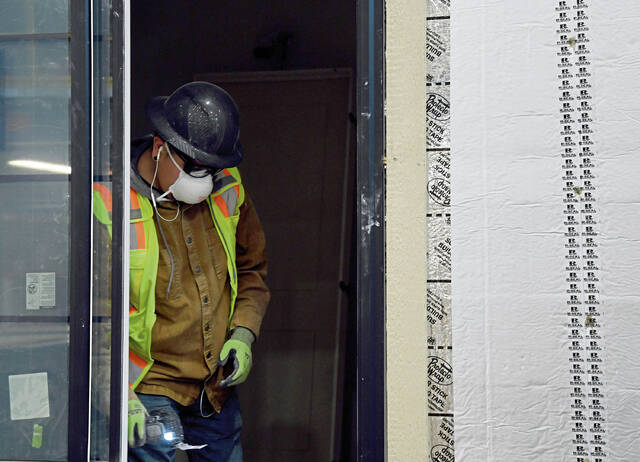The City of Pittsburgh’s Department of Mobility and Infrastructure (DOMI) conducted a public Zoom meeting Oct. 21 on the proposed Mon-Oakland shuttle service. The new service, using electric vehicles, would connect Oakland with parts of Greenfield and Hazelwood, such as development at the Hazelwood Green site.
The majority of the nearly 200 people in attendance were from Four Mile Run, part of the Greater Hazelwood community. The residents expressed their concerns and pretty much spoke with one voice. However, the voice only represented the people who live in Four Mile Run. They were organized by the project’s opponent. But Greater Hazelwood/Glen Hazel is much bigger, and there’s much more that needs to be taken into consideration.
For decades people living in Hazelwood/Glen Hazel have been subjected to generational economic and racial discrimination. Black people have endured these injustices and that struggle continues to this day.
The meeting was a stark reminder of how the plight of the marginalized and underprivileged continues to get covered up and pushed aside by the privileged. There were plenty of people in that meeting who have had all kinds of opportunities for good education, well-paying jobs, home ownership, business ownership — and the list goes on. For people of color who have grown up and still live in the community, that has not been the case.
Years ago, when Hazelwood Green was 178 acres of hazardous brownfield, a former LTV steel mill site, no one was standing in line to develop it. No one in the Greater Hazelwood community had the resources or the connections to address what was a huge environmental and public health problem. I often think about what would have happened if a private investor had gotten hold of that land and decided to develop it without any input from our community.
I’m thankful that our local foundation community came together to purchase the land in 2002. Have things been perfect? No. But there has been ongoing communication between representatives from the Almono partnership (The Heinz Endowments, the Richard King Mellon Foundation and Claude Worthington Benedum Foundation) and Greater Hazelwood leadership over the last 20 years. We have been intentional and proactive in making sure that the partners understand that we don’t want development to happen to us, but with us and through us.
Our neighborhood plan is called, “Our Hands, Our Place.” We’ve spelled out very clearly how the residents desire to integrate Hazelwood Green into the existing Greater Hazelwood neighborhood. The Almono partners have read our neighborhood plan and they are engaging with Greater Hazelwood Community Collaborative leaders to reflect the plan in the Hazelwood Green development.
This Mon-Oakland shuttle service proposal doesn’t sound like a perfect solution to every issue that our community is facing. But it offers what we see as numerous potential opportunities for African Americans and others who were born and raised in Hazelwood/Glen Hazel to take control of their own economy through high-tech education in robotics, green infrastructure and renewable energy, partnerships in land ownership and development at Hazelwood Green, and high-tech jobs and business incubation for local entrepreneurs to start and run their own businesses.
When discussing this project, we must consider more than one part of the community. We need to come together and work with DOMI, U3 (managers of the Almono site) and the Almono partners so that they hear and know what our priorities are.
We are living in a time where the world is calling for righteousness, justice and equity, and if we want to see our country turn the corner for the better, we must do something different from what’s been done in the past. It’s not acceptable to say we don’t want this and do nothing. People of color are looking for and need opportunities to control their own economy.
We’re living in a city where:
• Black incarcerated people make up 67.3% of the population of Allegheny County Jail as of April 2020; Black residents only make up 22% of Pittsburgh’s population.
• Pittsburgh police arrested 9,992 people in 2018, 60% of whom were Black. About 36% of those arrested were white. Black men between 19 and 29 had the highest number of arrests — 1,745, or about 17% of the total arrests last year.
• In 2017, African Americans made up 54.69% of all arrests, a percentage more than double their population in Pittsburgh. The bureau’s 2016 report did not offer exact numbers for that year, but in 2015 black individuals made up 54% of all arrests.
• Percentages were similar for the 1,265 frisk searches conducted by Pittsburgh police officers in 2018: 66.8% of people frisked were African American and 31.15% were white. The department only began publishing data on frisks in 2017, when 63.45% of the 3,453 people frisked by police were Black.
• Black boys and girls (age 0-17) are three to five times more likely to experience police referrals, arrests and school-related arrests to their white counterparts.
The residents of our community have seen the impact that social injustice has had on our neighbors. From the mid-1980s to the early 2000s, we’ve buried more Black boys than we can count, all of them between the age of 14 and 26. Why? Because they could get a gun quicker than they could get a job or a good education. This is not normal and it’s inexcusable.
It’s important for all of us to consider the strengths, weaknesses, opportunities and threats of the Mon-Oakland shuttle service proposal and work together with DOMI, U3 and the foundation community to make the issue not about the things we don’t want in our neighborhoods, but about the people we need to lift up and the equity we need to effect the kind of change that sets people up for a better quality of life.
The people of Greater Hazelwood/Glen Hazel are strong and intelligent. We know what’s best for our community. We’re not just asking for a seat at the table, because we have a table, one that has produced a comprehensive neighborhood plan.
When we as a community are presented with a proposal, we should be open-minded and strategic enough to navigate the details within that proposal through respectful conversations with whoever the presenters are. In our Greater Hazelwood Neighborhood Plan we have communicated what we call our “North Star” goal which is “Development Without Displacement.” In order for this to become a reality, we must work with all parties involved with a keen eye on where we’ve been, where we are and where we want to go.
Terri Shields is chair of the Greater Hazelwood Community Collaborative, a collection of organizations working together to transform Hazelwood’s future. It includes Hazelwood residents and Pittsburgh nonprofits invited into the community to participate in its redevelopment.








